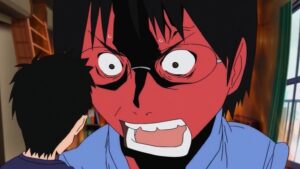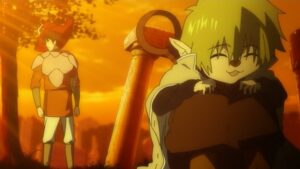Hello everyone, and welcome to another week of Welcome to the NHK! We are nearing the end, and the arcs are starting to reflect that. Big character moments, final scenes and all around stellar episodes abound. So without further ado, lets dive into it!
First up we have episode 19, “Welcome To The Blue Bird!”. However rather than jump right in with the narrative, I want to talk about something even more striking: It’s visuals. This episode was storyboarded and directed by Erkin Kawabata. I can’t pretend to know much about the guy. I hadn’t even heard his name until I looked it up for this post. What I can say though is that this was perhaps the most visually unique episode of NHK’s run so far. It’s ugly and unrefined art style, combined with some stellar layouts, conveyed the episodes emotion incredibly well. However between those emotional highs, it also lead to very janky lows. Stuttering animation, awkward models, and just messy screens in general. Was it worth it? I think so. But I definitely wouldn’t want to watch an entire series done this way.
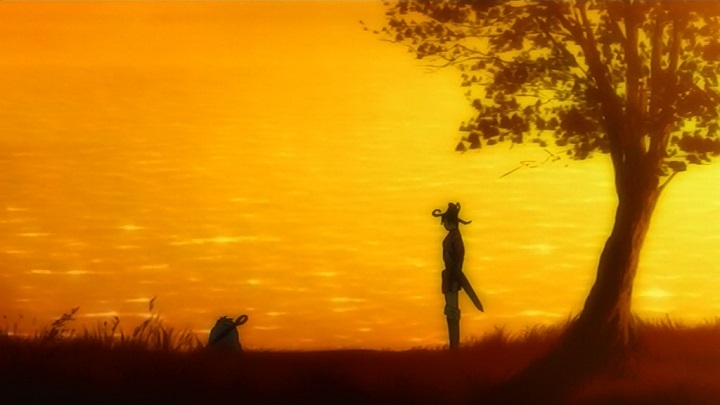
Moving on to episode 19’s narrative, this was… This was what I would call a climax. Quick review: It was fantastic. The episode starts by telling us a lot of what we already know. Detailing how Megumi fell into Mouseroad while having to take care of her brother after their father died. It’s a bit more detailed than what we got before, and a lot less manipulative since she isn’t trying to make them buy anything anymore, but still nothing particularly new. The main benefit, I think, is how NHK uses it to prime us for what is to come. It reminds us that Megumi is a victim here, even behind all of her manipulation. And it also preps us for the meat of the episode: The brothers side of the story, in his own words nonetheless.
The brothers conversation with Sato was, in two words, heart wrenching. He has all but given up at this point, believing himself to far gone. It’s that the he is unaware of his situation. He appears to know exactly what he’s doing to Megumi what he needs to do to fix it. Rather, it’s that he’s terrified to take that leap. What he has now is a slow, plodding death for them both unless he can make RMT work. But if he changes, if he goes outside? Who knows what could happen! That uncertainty terrifies him. And it’s this knowledge of his situation, rather than blissful ignorance, that makes his words to Sato hit so hard. Telling him to get out while he can, to log off permanently and escape his fate, the same fate Yamazaki showed him last week. He’s resigned himself to stagnation and death rather than change.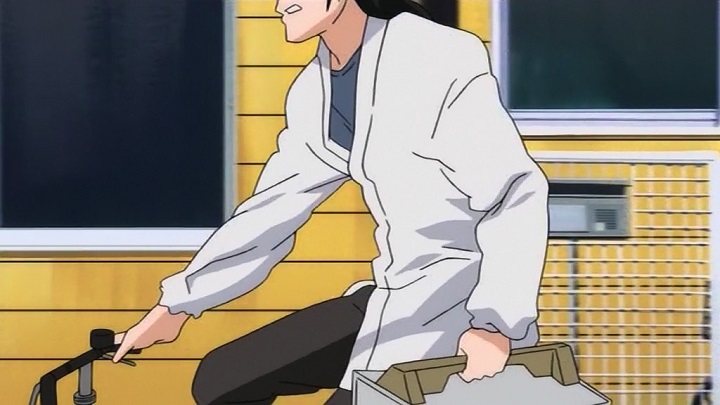
And with that… a month passes. Sato doesn’t hear from them and returns to working on the game with Yamazaki. He’s restarted his nightly sessions with Misaki. Things seem to be looking up. And then, for once in NHK’s entire run, something good happens: Mouseroad gets raided. Megumi is seemingly freed from her debt after no doubt being interrogated for a few days. The world is right again. But what about the brother? Well this is where I start to wonder about NHK a bit. I was expecting for Megumi to return home and find him dead. A sad, yet reinforcing end to his character and one that sets Megumi free from both of her obligations at once. It would be a suitable dark, and fitting, end to the whole arc. One that really hammers home how bad this condition can be. But instead, NHK decided to be… Surprisingly positive.
Instead of dying in his room with nothing to eat, he instead crawled his way out and got food himself. And with no money to pay for it, instead of going to jail he worked it off as a delivery boy. In the end, he found purpose not because he wanted to but because he was forced to. Now I don’t totally agree with the idea that you should abandon people to the world and force them to survive or die. But at the same time, NHK is sending a message here that there is no such thing as to deep. That you can always get out, always improve, always change for the better. A story about a man so far gone he had already given up on himself, finding a reason to live once more. So even if the communication isn’t perfect, it’s a still a message worth sending.
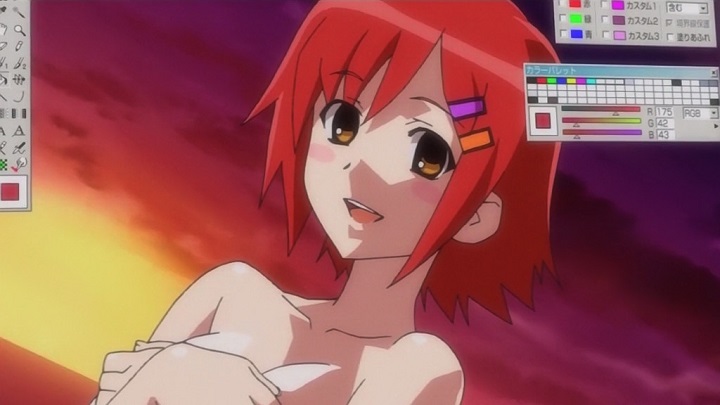
This brings me to episode 20, “Welcome to Winter Days!”. If anyone thought that NHK was going to let up after that positive ending, they couldn’t be more wrong. This episode is all about Yamazaki and his particular brand of depression. Where everyone else’s came from not being able to fit into society in some way, Yamazaki’s came from fitting in to well. Everything was going perfectly for him. He was in school, his parents were proud, his entire life was set out before him. The problem? He didn’t have any say in it. It wasn’t the life he wanted to live. So instead, he saves, packs up and moves to Tokyo to try and gain a semblance of independence. To live his own life and not the one his parents prepared for him. And the sad part? It doesn’t look like he succeeded.
I connect with Yamazaki’s issues a lot. I myself have a family business I was expected to take over at some point. But unlike Yamazaki, I managed to escape. To go to school, get a degree, move out and leave the whole thing to my little brother to run. Yamazaki doesn’t appear to have that same blessing though. He has no one he can foist it onto. So when the time comes to either let the whole thing rot, disappointing his parents and letting everything they worked for burn down, or to suck it up and go home, you can guess which he chose. And had I not been as lucky, I would wager I would have made the same decision. Yamazaki’s quest for agency in his life is just as poignant as any other character’s has been until now. And I’m absolutely amazed NHK managed to add it in.
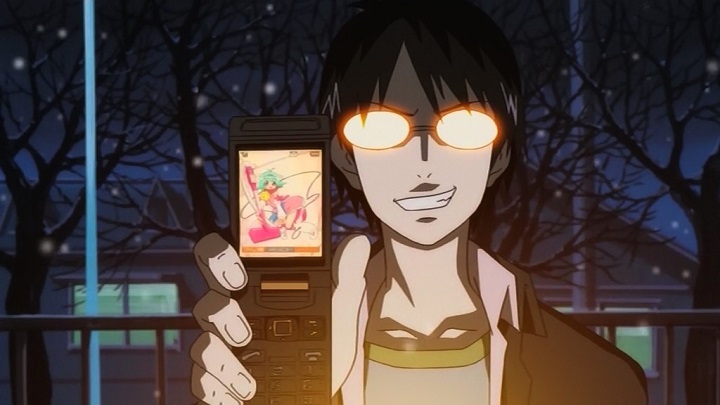
It’s not until the 2nd half of the episode that we start to see how this affects Yamazaki however. If the 1st half is like breaking news to a terminally ill patient, the 2nd is like a wake. Yamazaki starts burning bridges and checking things off of a bucket list. From burning his textbooks since he won’t be going back to school, to breaking up with Nanako. That 2nd one is particularly painful, as to me it almost felt he did it for her. He made himself seem as bad as he possibly could, drunkenly revealing all of his habits and going so far as to insult and belittle her to her face. All, in my eyes, to make the breakup his fault. A clean break, where should would have nothing to look back and regret. Maybe that’s a bit to hopeful, but that’s what it felt like.
With those done, Yamazaki now has only one thing left: His video game. That eroge he’s been working on with Sato for more than half the show at this point? That’s Yamazaki’s last will and testament. The last piece of Yamazaki’s life in Tokyo, the part of his dream he will leave behind when he has to go. It’s his swan song. Even if it’s successful, it won’t be enough to keep him from going home. This is just for him. And that’s why it means so much to Yamazaki. It makes me wonder just how much its going to end up meaning to Sato by the end to.
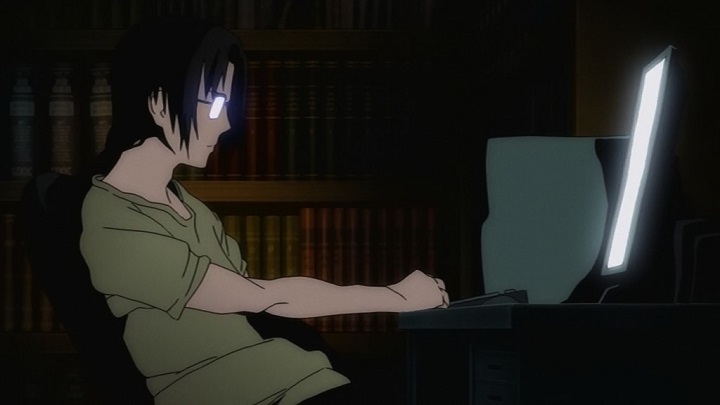
So yeah, all in all these were another great pair of episodes. NHK is pulling out all of the stops as we get closer to the finale. Hitomi and Megumi both got their closure and Yamazaki is in the midst of his final arc. It makes me wonder what’s going to happen for Sato and Misaki. Will they get a happy ending like the other two girls? A bittersweet one like Yamazaki appears to be heading towards? Or will NHK end on a dark tragedy, a heavy note to scare it’s viewers straight? I honestly don’t know. But I’m really looking forward to finding out in these remaining two weeks.
P.S. The brother crying in his room after the chat was absolutely soul crushing.



